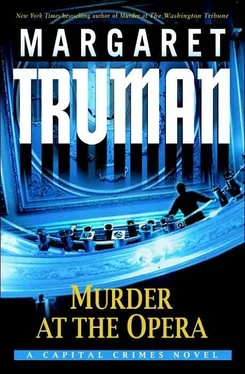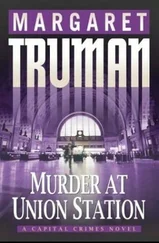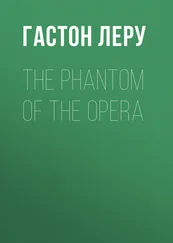“And screwed up,” Browning said. “A shame that he screwed up the young woman, too.”
Morris and Berry left the room and the building. Once outside, Morris said, “Warren’s in for a long, tough road once Homeland Security and Justice get hold of him.”
“The kid was scared,” said Berry as they walked to their car.
“It’ll be out of our hands soon, Carl.” Morris laughed. “You watch. They’ll take credit for this whole thing, use the kid as a feather in their cap, another terrorist plot foiled. All we did at MPD was-everything.”
As they drove back to headquarters, Berry said, “I have a request, Cole. A little favor.”
“Shoot.”
“Ray Pawkins got a couple of tickets to the opera last night for Sylvia Johnson and Willie Portelain. I had to pull the two of them out of the Kennedy Center early when the fax came in from New York. I’d like to buy them a couple of tickets so they can enjoy the whole show.”
“Willie Portelain at the opera?” Morris said with a chuckle.
“He said he liked it. I owe them.”
“Sure, go ahead. I’ll hide it under-under continuing education.”
“Too many Americans have a misconception that German cuisine is brown, heavy, and blah. But Germany is actually the birthplace of organic farming. Modern German cuisine is fresh and flavorful.”
So stated Marcel Biró, one of Germany ’s most celebrated chefs, cookbook author, and star of the Emmy-winning PBS reality-cooking series The Kitchens of Biró. He’d been brought to the German Embassy in Washington by the ambassador as a special treat for the fourteen guests dining there prior to attending the Opera Ball’s gala at the Brazilian Embassy. The menu had been created by him especially for the occasion, and he was on hand to explain and extol each course.
“Your entrée is a special favorite of mine,” he announced, “medallions of pork in a black cherry pepper sauce, with spatzle and braised fennel. The sweet tartness of the black cherries offsets the pork’s flavor, and the black pepper adds just the perfect bite to the dish.”
The evening had begun with tomato aspic with tiny shrimp, which Biró said was a typical northern German dish. The salad was asparagus tips with tiny slices of sweetbreads, a southern German dish. The wines he’d chosen for the evening were a white from the Rhine, and a red Bordeaux imported from the house of Tesdorpff, wine merchants since the 15th century. A parfait of Williams pear with beetroot sabayon, Malvasier, from the island of Madeira, was dessert.
“He’s absolutely charming,” Annabel remarked to Mac as they savored the pork entrée.
“That he is,” Mac agreed. He lowered his voice. “But I have to admit, my pedestrian palate is more attuned to sauerbraten, sauerkraut, and dumplings that sink immediately to the lower stomach.”
She giggled and put a finger to her lips. “Loose lips sink ships, and dumplings,” she said.
Everyone at the table agreed that the evening, at least the first portion of it, was a smashing success. The ambassador and his wife were a charming couple, and having the celebrity chef there only added to the sizzle.
They left the German Embassy and went to the evening’s main event, the party at the Brazilian Embassy. As they approached, pulsating samba and bossa nova rhythms could be heard, and felt, a block away. An overwhelming contingent of security people, uniformed and in plainclothes, made their presence abundantly evident. The Smiths’ invitations, accompanying photo IDs, and names from a computer printout were carefully checked, and they were allowed to enter the grounds on which the huge tent was the scene of a lavish, loud gala. Couples danced to the spirited music beneath rotating colored lights that painted an impressionistic swirl over everything, and everyone. Mac and Annabel made their way to a long table where uniformed staff poured cups of Brazilian coffee; they avoided the artfully arranged desserts. Costumed supers wearing elaborate masks were stationed at various spots around the dance floor to add color, and to chat with guests.
“When’s the president due?” Mac asked his wife.
“A half hour,” Annabel said.
A member of the ball committee approached. “Annabel,” she said, “I hate to tear you away from your handsome husband, but we could use your help for twenty minutes.”
“Mac?”
“Go ahead. I’ll wander a bit, catch up with you for a dance in a half hour-provided it’s a slow one.”
He watched her move through the crowd, her decidedly female form lovely to look at from any direction. He walked without purpose across the dance floor to an area surrounded by high bushes, the band’s volume buffeted somewhat by the foliage and distance. As with everywhere else on the embassy grounds, security was thick and tight. Two obvious Secret Service agents, their little earpieces a giveaway, stood with two uniformed MPD patrolmen and a heavyset black man, whom Mac assumed was another cop. He was right.
“Excuse me,” the black man said, “but aren’t you a lawyer?”
“I was,” Mac replied. “I teach law now. Mackensie Smith.”
“I knew I recognized you,” Willie Portelain said. “I testified in a couple of cases where you were representing the perps.”
Mac laughed. “I preferred to call them defendants,” he said. “I recognize you, too, Officer.”
“You were tough in that courtroom, man,” Willie said. “Made me sweat on the stand. Name’s Portelain. Willie Portelain, detective over at the First.”
They shook hands. “Looks like every police officer in the city is here tonight,” Mac said, looking back into the crowd.
“All I know is, I’m here.”
They were joined by Sylvia Johnson. Willie made the introductions.
“My wife’s on the committee for this affair,” Mac said. “I lost her for a while. Duty called.”
“Are you an opera buff, Mr. Smith?” Sylvia asked.
“Afraid not,” Mac said. “They roped me into being an extra-a super-in Tosca.”
“You were in the opera last night?” Willie said. “We were there, only-”
“Duty called us away, too,” Sylvia said.
“You didn’t get to stay for the whole performance?”
“We had to leave after the second act,” Sylvia said.
“Right after she stabbed that guy Scarpia,” Willie said.
“Dramatic scene,” Mac said. “So, what’s new at MPD?”
“Always something new,” Sylvia replied. “Or the old becomes new. Were you involved in the Musinski case?”
“No,” Mac said. “I’d given up criminal law by that time. They never did find the killer.”
Willie’s laugh rumbled from deep inside. “Case closed, Counselor,” he said.
“‘Case closed’? You’ve made progress?”
Willie looked at Sylvia before answering Smith’s question. They’d been sworn to secrecy about the Charise Lee case. An announcement would be made the following day, most likely by a spokesman for the Department of Homeland Security. But no one had said they couldn’t discuss the Musinski murder.
“Yeah,” Willie said. “That guy Grimes, who worked for Musinski at the school, confessed.”
“Oh?” Mac said, processing what Portelain had just said.
“We knew it was him from the git-go,” Willie said, “but nobody could ever put together a case against him, at least not enough to prosecute. Till now anyway.”
“That’s interesting,” said Smith. “Wasn’t there talk of missing manuscripts, musical scores?”
“That’s right,” Johnson agreed.
“The fellow who confessed, did he admit taking those, too?”
Willie shook his head.
“He swears he didn’t even know anything like that was in Musinski’s house,” Sylvia said. “It’ll probably be in the papers tomorrow.”
Читать дальше












